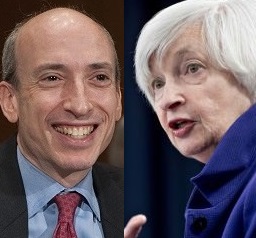By Josh Hammer, Opinion Editor. October 21, 2021. (Newsweek).
The Chinese Communist Party poses the most comprehensive 21st-century threat to the American nation, the American people and the American way of life. The first half of this century will be defined by how the U.S. meets the Chinese challenge across the full spectrum of economic, national security, geopolitical and cultural issues. And an easily neglected aspect of our new great-power competition with our Far East arch-foe now cries out for diligent and prompt attention: safeguarding the fruits of the nascent, but ascendant, cryptocurrency revolution.
Last month, China effectively banned all cryptocurrency trading and mining, which the Communist Party increasingly views as a threat to its planned “digital yuan” sovereign digital currency, which may be released as early as 2022. The People’s Bank of China, the Chinese central bank and Federal Reserve equivalent, barred international exchanges from providing cryptocurrency services to Chinese investors and speculators. It also banned financial institutions and digital exchanges from facilitating domestic crypto transactions.








